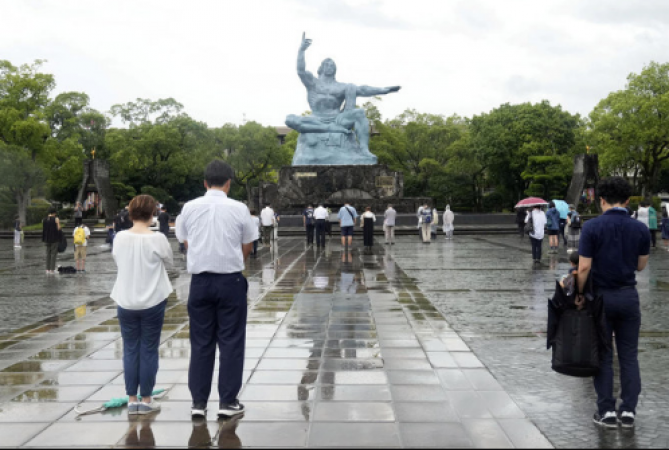
Tokyo: The mayor of Nagasaki called on world leaders to ban nuclear weapons on the 78th anniversary of the US bombing of the city on Wednesday. He claimed that nuclear deterrence also raises the possibility of nuclear war.
Shiro Suzuki made the statement following the adoption in May of a separate nuclear disarmament document by the Group of Seven industrial powers that advocated the use of nuclear weapons as a deterrent.
As Nagasaki Mayor Shiro Suzuki stated in his peace declaration on Wednesday, "Now is the time to show courage and make the decision to break free from dependence on nuclear deterrence. As long as states are dependent on nuclear deterrence, we cannot realise a world without nuclear weapons."
According to Suzuki, other nuclear states have been prompted by Russia's nuclear threat to increase their reliance on nuclear weapons or improve their capabilities, which has raised the risk of nuclear conflict and demonstrated that Russia is not the only nuclear power that poses a threat to nuclear deterrence.
Also Read: Pakistan's Bold Move: Urges Iran to Rethink Commitments in Massive Gas Pipeline Venture
On August 6, 1945, the United States dropped the first atomic bomb, obliterating Hiroshima and killing 140,000 people. 70,000 more people were killed in a second attack on Nagasaki three days later. On August 15, Japan gave up, bringing an end to World War II and its nearly fifty-year aggression in Asia.
Participants in the ceremony observed a moment of silence with the sound of a peace bell at 11:02 a.m., the time the bomb detonated above the southern Japanese city.
Suzuki expressed worry that as time goes on and memories fade, the tragedy will be forgotten. Survivors have expressed frustration at the slow pace of disarmament and the lack of global awareness of the atomic bombing and their experiences.
The worry follows a strong response to social media posts about the "Barbenheimer" summer blitz of the "Barbie" and "Oppenhheimer" films, which incited outrage in Japan.
Also Read: Pakistan's Bold Move: Urges Iran to Rethink Commitments in Massive Gas Pipeline Venture
"Barbie" and a biography of J. Robert Oppenheimer, who worked on the atomic bomb, combined to inspire memes, including ones with mushroom clouds. The craze was perceived as downplaying the horrifying cost of the bombings of Nagasaki and Hiroshima.
The first step towards creating a world free of nuclear weapons, according to Suzuki, whose parents were hibakusha, or survivors of the Nagasaki attack. The testimonies of the survivors, he claimed, are a genuine deterrent against the use of nuclear weapons.
The path towards a nuclear-free world has grown more difficult as a result of rising tensions and conflicts, such as Russia's war on Ukraine, according to Prime Minister Fumio Kishida, who did not personally attend the memorial. Deeper divisions within the international community are another factor affecting the disarmament movement.
In an effort to highlight the G7's commitment to nuclear disarmament, Kishida, the MP for Hiroshima, has angered the survivors by arguing that having nuclear weapons is necessary for deterrence and by declining to sign the Treaty on the Prohibition of Nuclear Weapons.
Suzuki urged Kishida's administration to sign and ratify the treaty as soon as possible and to send a representative to the upcoming conference "to clearly show Japan's resolve to abolish nuclear weapons."
Also Read: Three Police Officers Detained Amidst Riots and Unrest
As an ally of the US, Japan is covered by US nuclear policy and seeks greater security cooperation as a response to Chinese and North Korean missile and nuclear development threats. Kishida's administration is pushing for a military buildup that focuses on strike capability as part of its new national security strategy.
The Health and Welfare Ministry reports that as of March, 113,649 survivors, whose average age is 85, are recognised as hibakusha and qualified for government medical assistance. Many more people still lack assistance, including those referred to as "victims of the black rain" who reside outside the original designated areas